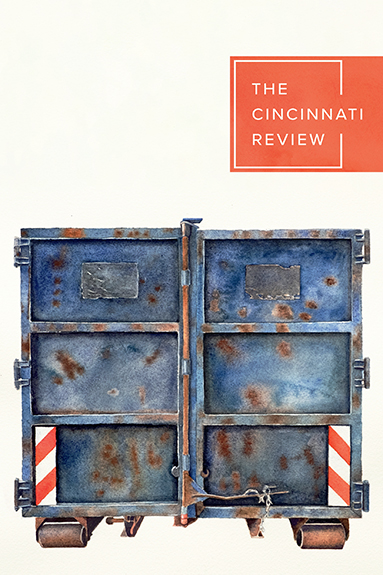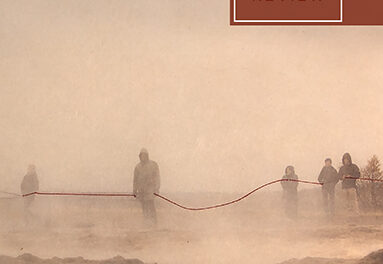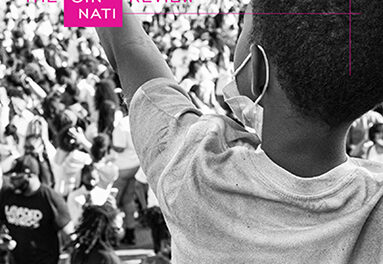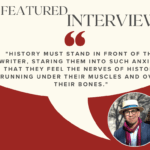Winner of the 2024 Robert and Adele Schiff Award in literary nonfiction
1
Pears fall to the yard, green bombs hitting green earth with a thud. Under the pear tree I read, journal, dance. I pet my calico cat, Rosie, and wave nets in the air attempting to catch butterflies. Down the hill from the pear tree are black raspberry bushes, empty of leaves and color in the winter. In early spring the bushes sprout green leaves, and pink buds bloom. Late spring and the berries grow plump, turn color. I pick the black berries off the vine with my mother, father, and brother beside me, my hands almost clammy in the soon-to-be-summer air. We eat as we pick. Our shirts, mouths, hands, all of us stained indigo.
In the summer my father falls asleep outside, flat on a foldout chair, mouth agape, snores loud. Fireflies sparkle around him. Crickets squeal. The sky, bright with starlight, moves, clouds dissipating and reforming. There’s heat lightning in the distance, a fraction of the sky pulsing with a strange red shadow. Beside my father is his can of Busch beer and a large yellow bowl full of the berries we picked earlier that day. Inside the house I wake, carrying myself lightly down the hallway, seeking the yellow bowl of berries.
Neither I nor my father could imagine leaving the bowl alone, letting the berries’ perfect ripeness go to waste. We gorged ourselves on them. We ate so many berries. And still I can’t remember their taste.
* * *
The Busch can, this key image from my childhood in northeast Ohio, is a nonstop violence. Grays and blues working together to create the image of a snowy mountain peak; BUSCH in bold type. Thirty-packs from the Shell station empty within two afternoons. Beside the garage my father smashes the empties with his foot. The squashed aluminum piles up, taunting me, until the cans are taken to recycling. Every time a thirty-pack empties, my chest whispers the oldest prayer I know: Please stop drinking.
What is this violence, though, compared to the violence of my father’s father? Am I allowed to be heartsick over continued drinking when the drinking was born from real evil? My father’s father dynamited the farmhouse they called home when my father was six years old. He bought fifty sticks of dynamite and a fifty-foot fuse cord, placed the block of explosives in the basement. He made sure that he and his eldest son, Terry, were out of the house when the dynamite erupted. He also ensured that his wife and three other children would be located directly above the dynamite. Attempted murder of two of his sons, one daughter, and wife.
For the first eleven years of my life, my last name meant nothing special to me, but down the road, two small towns over from ours, the name Gallion still echoed with scandal. My father, an all-Ohioan point guard in high school, could not be divorced from his father’s actions. The last name forever embalmed in tragedy. My father, caged in unforgivable violence, barred from absolution.
* * *
My parents work on two puzzles at a time at their dining room table. Right now, van Gogh’s Café Terrace at Night sits scattered on the table, as does a landscape portrait of a Christmas village. One puzzle is all golds and blues, and the other is all blacks and whites, pops of red in scarves and hanging mistletoe. My father tells me that working on two puzzles at once keeps his and my mother’s eyes “fresh”; he enjoys switching back and forth between the two, getting into a groove with one puzzle and then moving on to the next when that groove slows. The puzzles and the garden out back—corn, green beans, tomatoes, peppers—keep my father busy. Recently he got into bird-watching, sitting in a lawn chair and drinking while watching woodpeckers and orioles peck through seed. Dad retired early, at age forty-eight, when I was entering my junior year of high school, from the first job he got, back when he was eighteen: Nickles Bakery in Navarre, Ohio. He smelled, always, like dough—doughnut dough, bread dough, it all smelled the same: warm and safe and knowable.
My mother still works. She drives to Akron every day, sometimes for twelve-hour shifts, from the southern part of Canton, near Navarre. She provides safety training to new employees at Goodyear and analyzes factory equipment to make sure it’s up to code. Until three years ago she made tires, incredibly taxing manual labor. She took her promotion to a desk job very seriously, enrolling herself in a Microsoft Excel course at the University of Akron immediately afterward. This one-unit class was more college coursework than she or my father had ever taken, and much more than their parents before them. In northeast Ohio, first-generation college students make up 58% of total community-college enrollment and 36%–37% at four-year institutions.
Northeast Ohio, once a hub for manufacturing and agriculture, now looks like a skeleton of its past self. The Baker Motor Vehicle Company and the White Motor Company, once huge employers for the greater Cleveland area, were consumed by General Motors—unfortunately, given that in March 2019, GM closed its largest Ohio plant, squeezing nearly 1,500 people out of their jobs. Akron, the “Rubber Capital of the World,” currently employs approximately 4,500 people at Goodyear Tires and another 3,000 at the company’s rival, Firestone Tires. But Ohio’s claim to the rubber crown used to be stronger, backed in 1950 by 130 different rubber manufacturing companies, employing more than 85,000 workers. Coal plants, steel mills, and other factories closed too. Their smokestacks and rusted machinery can still be seen everywhere in small towns, unused and derelict, sad reminders of a once accessible upper-middle-class lifestyle. Stark County, where I was born and where my family still lives, has undergone a 43% loss in manufacturing jobs since the 1950s. Stark’s next-door neighbors, Summit and Portage Counties, have suffered a loss larger than 58%.
Rust Belt, though derogatory in meaning, is a perfect fit for Canton. Most of the friends I made in elementary and middle school had a parent (sometimes both parents) that worked at Timken, a manufacturing company that produces automobile bearings and other assemblies. Now, having graduated with bachelor’s degrees in engineering, some of the men and women I went to high school with have returned to Goodyear or Timken, savvy in business and marketing. They put on button-up shirts every morning and sit in air-conditioned offices. Our parents, though, wore uniforms. They wore nonslip shoes or steel-toe boots, depending on the work. They sweated over hot iron, hot steel, melting rubber. Our fathers, our mothers, would come home with bruises from faulty equipment, forklifts gone awry; worse yet were the lopped-off fingers. In 2016 Goodyear was forced to pay $1.75 million when four of its workers died on the job. A man was found in a six-by-eight-foot boiling cauldron full of scalding water and oil. My mother told me recently that one morning before she arrived for her shift on the tire-making line, another woman lost her arm to the machine my mother used almost every day.
My grandmother on my father’s side, Faye, had her first child at twenty. She was a stay-at-home mother, the leader of chores and dinner, of cleaning the barn and collecting the chickens’ eggs. She was also heavily involved with the local Lutheran church that the Gallion clan belonged to. My grandfather, Lloyd, worked at Republic Steel, where most of the men living in Mineral City, Ohio, in the 1960s worked.
I like thinking of the dichotomy between my grandfather, working with steel, and my father, working with dough. One soft and malleable, the other hard and impenetrable. My father’s clothes, an all-white uniform, smelled of flour and sugar, like cookies about to go into the oven. Perhaps when he turned eighteen, my father had sought a job that was as opposite as he could get from his father’s. A place not of steel but of bread, of doughnuts, of sticky sweetness and hope.
* * *
I have a childhood memory that I’m not sure is real. My hair is white, and there’s a red birthmark on my stomach. My father calls it my strawberry. It is both dark and bright, and it sticks out above the top layer of my skin like a wart. I’m in the bathtub, and my mother is on the floor beside the tub, watching me. She looks tired, but more than that, she looks unhappy. She looks beaten by a sadness I don’t yet understand. I’m trying to negotiate her heavy mood away: I make silly noises, splash the lukewarm bathwater, hand my mother one of the toys I treasure. I cannot bear to see her forlorn.
It is nighttime, and I should be in bed by now. Downstairs the door slams. My father crash-climbs his way up the fourteen stairs of our home, and I can hear his footsteps. I count them out. When I get to fourteen and he’s there, I’ll look to him for reassurance that Mom will be fine, that his drunkenness is okay. My father got off work six hours ago. He went to Kiki’s, the bar across from the bakery, again after work. My mother is sad because he goes to the bar instead of coming home to see us. She knows that he knows she is sad, and still he goes to the bar. Last time my parents fought about Kiki’s, my mother asked why he didn’t just drink at home. She’s been pleading for my dad to be home, but she’ll settle for the drunk version of him if it means he’s here.
My father comes into the bathroom and my mother does not look at him. He cries “My pumpkin!” and I smile and squeal, want out of the tub. When he tries to sit next to my mother on the floor, he falls, his legs folding away from him like a collapsible tent. And he laughs, but my mother doesn’t, and I become conscious to our reality: my father is not okay. I laugh because I don’t want my father to hear the silence that’s in the room otherwise. I laugh because I don’t want this comprehension. I want him to be okay. I want, desperately, for him to be okay.
* * *
Throughout his prison sentence, Lloyd, the steel man, maintained his innocence. He claimed, ruthlessly, that he was the victim of a frame job by malicious coworkers at Republic Steel. Court documents from his trial, starting in December 1966 and ending in January 1967, show a plea of not guilty from my grandfather and his attorney. Nonetheless, he was found guilty of malicious destruction of property, illegal possession of an explosive, unlawful placing of an explosive, malicious placing of an explosive, and four counts of assault by means or force likely to produce death or great bodily harm. He was sentenced to ten to twenty years in prison on the fourth count, malicious placing of an explosive.
From 1967 to 1990, my grandfather was incarcerated. Within those years, Lloyd’s eldest son, Terry, became a father to three children; Lloyd’s only daughter, Brenda, gave birth to two little girls. By the time he was released from prison, Lloyd was seventy-three years old. My father, Duane, was thirty-five. I was two years away from being born. Lloyd would die in 1994.
2
My father read my copy of The Great Gatsby on his jail bunk. I was sleeping in a top bunk myself at the time, in a small college town an hour and a half away from Canton, where Amish buggies strolled through regularly. When it had been time to decide, I’d gone with the college where I felt the most at home. I’d fallen in love with Bixler, this old squat brick building that smelled of books and coffee, home to the English, Philosophy, and Foreign Languages departments. I’d fallen in love with the office of my soon-to-be mentor, the way his editions of the Best American Essays and Best American Short Stories piled around the room like wallpaper. I liked the thought of who I could become in this building, in this office.
My parents, especially my mother, had extended themselves to make college happen for me. I’d overheard bitter arguments about credit scores and login information for FAFSA. I would take out too many loans from too many predatory lenders, and even more to help cover the prices of my books. My parents and brother cried when they dropped me off at college. I didn’t sleep for the first two nights, just stared at the unfamiliar ceiling, trying to accept it.
That summer, 2010, had proved to be one of the most tenuous for my relationship with my father. The two of us had fought like animals. Before that, I’d cradled my father’s addiction, held it tightly so as not to look it in the face. The girl in the bathtub, pliant and docile, desperate to believe in her father, had stayed in the bathtub for far too long. She pruned in lukewarm water, and eventually the water turned cold, the girl turned woman. I yearned for the ability to laugh at my father’s Pink Floyd nights, when he’d close the basement door and blast his stereo, cycling through Animals, The Wall, and Wish You Were Here. I used to be able to sneak into the basement, jump atop the couch with him, play air guitar like he’d taught me. But as an adult, I couldn’t. When I heard the beginning riff of “Wish You Were Here” surge from the basement, I put my head under my pillow, willing it to end. If I did enter the basement, I’d often find my father unconscious on the staircase, his skin smelling like his homemade pear wine. I’d step over his body without feeling.
A few months into my first year of college, when snow piled in heaps across campus and the dormitory halls blasted a claustrophobic heat, my mother called to tell me that my father had been found that morning in the driver’s seat of our white 2003 Subaru Outback, drunk and unconscious. The car had veered off the road, possibly because of black ice but more likely because he’d fallen asleep at the wheel. He didn’t have a cell phone to alert anyone (and still doesn’t). He didn’t remember the car crash, just remembered a police officer waking him in the early morning. He was arrested for operating a vehicle while impaired. This was his fifth DUI.
Beside me in the top bunk, when I got that phone call, was my binder for Intro to Creative Writing. Inside it were pieces of poems or essays or stories that I couldn’t decipher, couldn’t finish. I loved so much about college: art history classes, access to theater performances, the option to minor in philosophy, mozzarella sticks served until two a.m. Three months in and already my comforter was stained with spillage from Mountain Dew, hot tea, Cheetos dust. It now looked just like my comforter at home. Here was exactly the same as there.
* * *
Dad chose The Great Gatsby off my shelves at home before going into prison. He said he chose it because it was short, but I think he saw how often I read it. I didn’t speak to my dad the three months he served in prison. I didn’t speak to him the two months after, when he shared a room in a halfway house with a twenty-year-old addicted to meth. When he returned home, skinnier and sadder, he told me he’d enjoyed the book but found it incredibly depressing. Daisy was a real bitch, and Tom? What an asshole. I never told him that Daisy was my favorite: that in her existed the faraway, incomprehensible feeling of longing, of wishing for a different future, different past, different fate, but being incapable or, maybe, ultimately unwilling to manifest the difference. Daisy looked at Gatsby with heartbreak for time lost, and I looked at my father the same way. I wanted to love him. I wanted to tell him that I understood, or that I wanted to understand. That it was okay to tell me, to talk to me. Alcoholism does not have one root; it has many. I wanted to dig into the ground and uncover them all, rip them from their beds where they’d been resting for five decades, break them into unrecoverable bits of nothingness. But they were buried so deep, and believing that they could be uncovered threatened to bury me in the clay of hope again and again and again, ad infinitum. I was afraid in the dirt I would find addiction too, grow my own roots. Stay there forever.
3
At Republic Steel, Lloyd Gallion made enemies. After work the men would gamble, smoke cigars, disclose their problems with their wives or children, all a sort of braggadocio, high school athletes yearning still for competition.
I see a bit of myself in my grandfather’s ability to turn mundanity into symbolism. Lloyd became paranoid, obsessed with the idea that his coworkers were planning to rob him, harm him or his family for the money he owed them from gambling. In 1966, the year of the explosion, three fires were started on his property. Each time the fire department was called, but the firefighters couldn’t find any evidence to suggest arson. The fires seemed not only manageable but pristine, as if lit only to be extinguished.
When the fires flamed on the property, Lloyd had been absent, a fact my grandmother admitted while testifying. Before sunrise on each occasion, he’d taken one of his sons fishing at a pond nearby called Paradise Lake. Always one of the three sons saved, never the daughter, never my Aunt Brenda. Brenda was the only Gallion child to take the stand at her father’s trial. She was fourteen years old. Both of her legs were in casts, and eight of her toes were either blown off or in traction.
After the failed fires, Lloyd called a family meeting. He told them that they were threatened, could be under attack. He began sitting up at night inside the barn, pacing, rifle in his arms. He didn’t sleep much. It was in that haze that he devised the “meeting place,” the gathering spot right inside the house’s front door. He told his wife and children that if they heard a gunshot from outside, it was his sign that their attackers had arrived. My grandfather would protect them, doing what he could do with his rifle before retrieving the family and fleeing.
My father remembers having drills: waking to his older brother Phil punching him in the arm and racing down toward the front of the house. They never knew if Lloyd’s shot was only a test or if something was truly happening, the attack finally come to fruition. From the trial and from evidence collected at the Mineral City farmhouse, the State of Ohio came to believe that Lloyd started fires on his own property in the hopes that the flames would incinerate the house, burn and suffocate the people inside. He set his property on fire and left for Paradise Lake in the early morning hours several times, each time taking one of his three sons with him. When the fires failed, Lloyd bought fifty sticks of dynamite from a hardware store in Dover. He placed them in the basement, directly underneath their meeting place, that small foyer at the front of the house. He loaded his eldest son, Terry, age thirteen, into the truck, shot his rifle into the woods to alert the family they should go to the meeting place, and hid somewhere to light the fuse. He believed his family would be dead upon his return.
My grandmother testified that a gunshot woke her up. She assembled Brenda, Phil, and my father in the meeting place, worried that another fire was ablaze. I wonder if Terry, wherever he was in the truck, knew he’d been saved. Was he there, watching his father shoot a bullet into the air? Did he ask what it was for? Maybe Terry watched the blast from his father’s truck, his half-asleep boy-body jolted awake by an echo that sounded like a wail. How did it feel to know that something macabre and sinister boiled beneath their fishing trip?
We trust our fathers despite. We trust our fathers, sometimes, because of the macabre, because of the sinister. When they choose us, the sinister gleams, turns saccharine. When they choose us, they are golden, and we are too.
4
I ask my brother and my mother how much they know. They don’t know that I’ve read the court documents, that I’ve parsed through hundreds of pages of handwritten evidence, jury selections, attorney notes. For my mother and brother, my father’s trauma is known only through the one conversation my father has ever provided them. And through hazy references at Gallion family holidays, the term D-Day passed around with the gravy and the mashed potatoes and laughter. My father and his siblings mention their father and that one time he chased a chicken with its head still partially attached to its body because he didn’t chop the neck correctly.
Ethan and I have different recollections of the conversation my father had with us about D-Day. He remembers us seated around the Christmas tree, which would have been in the basement. I remember us at the kitchen table, my father five tall-boy Busches in. Ethan thinks we were eight and ten; I believe we were ten and twelve. But the content of the revelation remains the same for us both: Dad told us that when he was six years old, his father tried blowing him up, along with Brenda, Phil, Grandma, their house. We stayed silent. I remember nothing of how I felt, whether I was shocked. Neither does Ethan. What we remember instead is the sense of finally belonging with my father’s family; we could understand their references, could even begin to understand why they’d nicknamed the event. Dad didn’t tell us of the pain he’d experienced then as the youngest child—the pain of not being chosen by his father, of seeing his home destroyed, of watching his brother and sister and mother fall to the cement floor of the basement, of hearing his brother’s legs crack upon impact. From court records, I know that my father was the only victim to not be physically injured; somehow, when the dynamite erupted, he intuitively wrapped his small arms and legs around a wooden rafter, a koala bear holding on to what’s left of safety.
My mother had learned of the Gallion bombing the first time she went to Thanksgiving dinner. She laughed along as Brenda, Phil, Terry, and Dad tried to remember if a certain memory of their father happened before or after D-Day. When my mother asked what D-Day was in the car after dinner, my father told her the same details he told us as kids—the bare bones, the facts. Dad bought dynamite. Dad blew us up. Dad saved Terry. Dad failed. Dad went to prison. She wanted more details, but each time she asked, my father gave her the same bullet points. Lloyd was imprisoned, gone from my father’s life. I think he wanted desperately to believe that as long as there were bars between him and his father, as long as he and his siblings could laugh about what had happened, the pain could remain in the past. He could tell his children once, his wife once, and he could keep living, pretending that at six years old he didn’t experience a death, a trauma, a pain so big it exploded a house.
But then me. I watched him drink, and even as a child, I knew he did so with purpose. There is a supreme conviction in the way he drinks, his commitment to disassociating from reality. I watched him numb himself with Busch at nine in the morning, at dinner, at Pee Wee baseball games. I felt his pain somewhere deep inside me, as if I had been the one clinging to a still-standing ceiling rafter as my family wailed beneath me.
I want my father to know that I know it all, that I’ve read it all, that his trauma is one I’ve held sacredly against my chest. I want him to know that there were months, years, when I hated him for his drinking, for his cruelty brought on by inebriation, but that now I want only to sit beside him in silence. I want to sit on the bank of a body of water, maybe Paradise Lake. I want to watch the water ripple, want to see his face in childish joy when a fish makes a surprise leap from the surface.
The paradise I seek is not ignorant of violence. There’s ash from long ago that still sometimes falls. If my father and I both believe, maybe we can turn the ash into rain, let the water sanctify us.
Erika Gallion Velasquez (she/her/hers) is a Los Angeles–based writer originally from Canton, Ohio. Her published writing has appeared in Entropy, Angel City Review, Women’s Review of Books, The Racket, and elsewhere. Gallion is the author of the Substack Matches Struck Unexpectedly in The Dark. For more information visit erikagallion.com and @erikagallionvelasquez on Instagram.
For more great literary nonfiction in Issue 22.1, order now in our online store. Digital copies are only $5.










